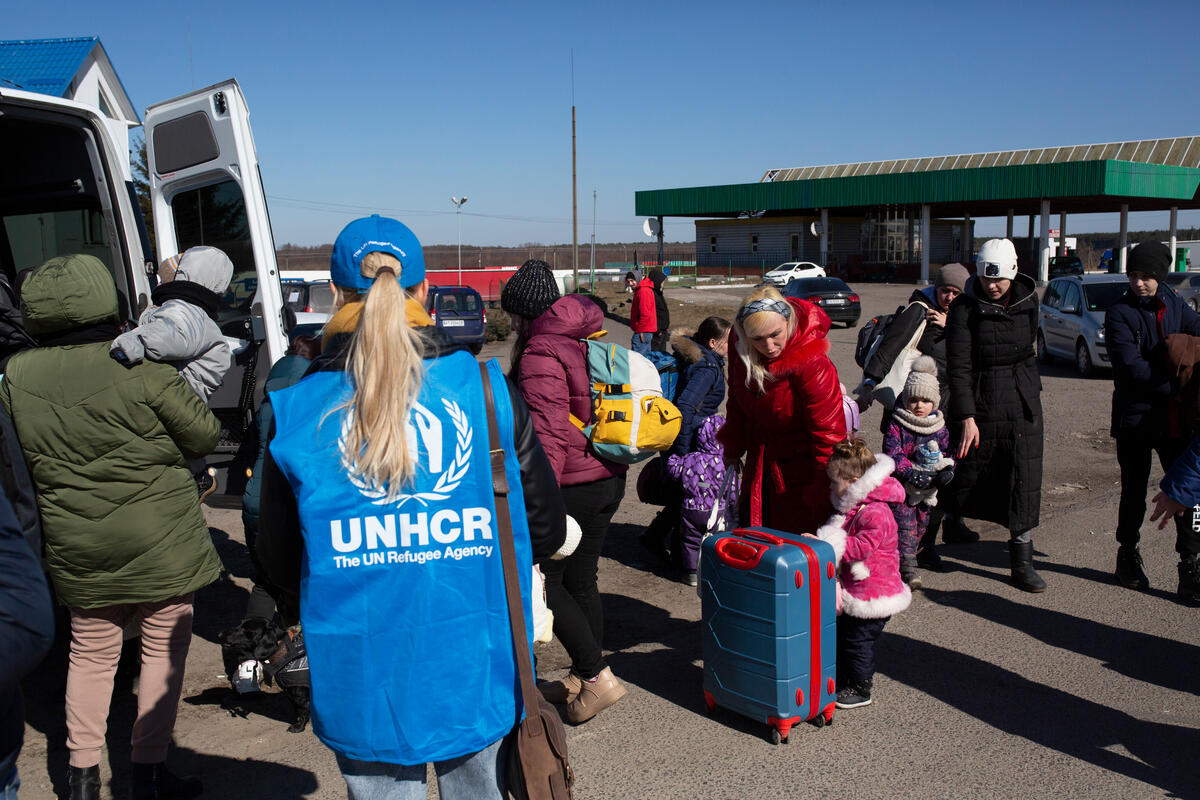UNHCR has been present in Ukraine since 1994, when the Agency supported the repatriation of Crimean Tatars, and concluded a Host Country Agreement with the Government of Ukraine in 1996. In line with its mandate, UNHCR provides protection services and assistance to help refugees, internally displaced persons (IDPs), returnees, war-affected and stateless people access their rights and essential services and find sustainable solutions. In 2014, UNHCR scaled-up its presence in eastern Ukraine to provide humanitarian services and assistance to people impacted by the war. Following the full-scale invasion by the Russian Federation in February 2022, UNHCR has further expanded its operation and is now present in several locations across the country.
The full-scale invasion of Ukraine in February 2022 has resulted in loss of life, separation of family members, loss of homes, belongings, savings and jobs. Inflation and the contracting economy places families and communities who have been torn apart by displacement in an increasingly precarious position. Civilian infrastructure has been damaged or destroyed, disrupting the supply and access to gas, electricity and fuel. Attacks by missiles, rockets and drones continue to pose a risk to the safety and security of millions of Ukrainians.
Approximately one-third of Ukrainians have been forced to flee their homes and around 3.7 million are currently displaced within the country, while some 5 million are displaced as refugees abroad. It is currently the largest human displacement crises in the world and the fastest growing displacement situation since World War II.
The humanitarian needs inside Ukraine continue to grow as the war continues and 14.6 million people are considered to be in need of humanitarian assistance according to the 2024 Humanitarian Needs Overview and Response Plan. IDPs, older persons, and persons with disabilities are among the most vulnerable and severely affected by the war. UNHCR is one of over 650 organisations and partners operating in Ukraine as part of the inter-agency humanitarian response and has expanded the scale and reach of programmes to deliver assistance and services as close as possible to the frontline and in regained areas where people with high vulnerabilities have remained, and to displaced people and returnees.
UNHCR’s overall financial requirements for 2024 are $599 million. More details are available in the Ukraine Situation: UNHCR Supplementary Appeal 2024, and the 2024 Humanitarian Response Plan
UNHCR supports and complements the Ukrainian authorities’ response through three main areas of intervention:
(1) delivery of protection services, community-based protection activities and advocacy work,
(2) emergency shelter and housing assistance and promotion of access to dignified temporary and medium-term housing solutions, and
(3) support in addressing the basic needs of affected people through cash and distributions of essential items (NFIs).
Ahead of the winter, UNHCR launched a winterization response as part of the collective effort to help war-affected people stay safe, warm and protected in dignified accommodation during the harsh winter months. UNHCR’s target was to reach almost 1 million people with winterized items like thermal blankets, sleeping bags, thermos flasks and solid fuel heaters; cash assistance to cover additional costs related to heating during the winter; and with collective centre expansions and improvements and housing repairs and insulation, to enable people to remain in their own homes.
Globally, and in Ukraine, a priority for UNHCR is to support displaced people’s ability to find a durable solution to their situation. This includes supporting IDPs who have no prospects of returning anytime soon to integrate and build a new life in their area of displacement, and supporting refugees and IDPs who would like to return to their homes to do so in a safe, dignified and sustainable way. In order to inform durable solutions planning and programs, UNHCR regularly conducts Intention Surveys among IDPs, and with refugees from Ukraine who live in European countries. The latest surveys were published on February 2024 and find that the absolute majority of IDPs and refugees from Ukraine wish, and ultimately intend, to return home, and that the main obstacle to their ability to do so now is safety and security. Other key obstacles, or enablers of dignified and sustainable return are access to adequate housing, basic services and jobs.
UNHCR is working closely with the Government of Ukraine, in the framework of the National Recovery Plan, with local actors and with partners like IOM, UNDP and OCHA to promote people and community-centered programs that help displaced people access housing repairs and support, assistance and livelihoods programs and basic services and other relevant support in their areas of return. UNHCR strives to ensure that our response is aligned with and complement the national social protection system and housing programmes. Local actors have extensive and long-standing experience in communities, with a substantive understanding of the needs, challenges and opportunities. Harnessing this expertise and learning from it is critical for UNHCR to deliver effective and sustainable programmes.

